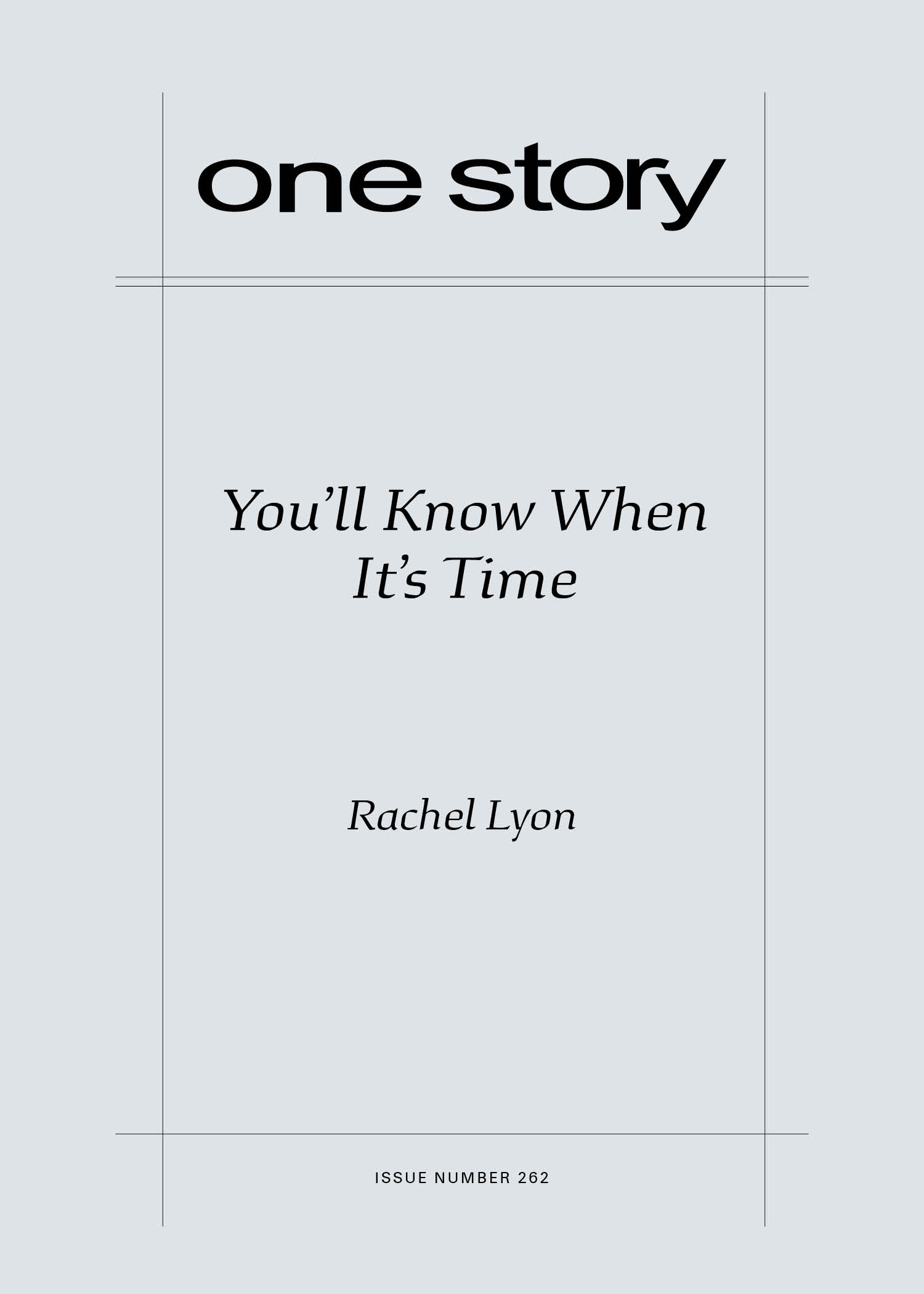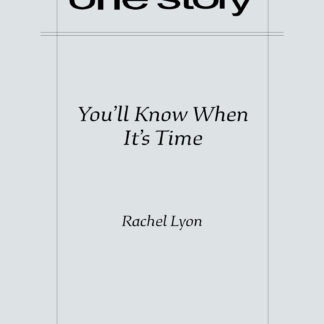
You’ll Know When It’s Time
$2.50
46 in stock
Excerpt
Once the cat died she would move to Delaware. That was the plan. She’d been doing some research and found a lovely little retirement community on the water. It got humid in the summers and the shores were prone to flooding and once, during hurricane season the summer before last, the town had to evacuate, and they spent two full nights lined up in sleeping bags on the floor of the high school gymnasium, but everywhere had weather now. In Delaware the beaches were pretty, it didn’t get too cold in the winter, the real estate was affordable. The county had a nice library with good programming—a book club, movie nights, SoulCollage—and a charming young (African-American!) Democratic mayor. There was a robust recycling plant and a family-owned diner and a quilting museum.
Though none of that actually mattered, not really. The main thing was she had to get out of Farmington. She’d been here thirty-five years—though it hardly felt as if she was that woman who’d been here so long, anymore. The woman who’d lived here shared her name—Ida—and her voice, and her childhood, and some of her wardrobe, but that Ida was, if not happily, at least uneventfully married.
Rachel Lyon
Rachel Lyon is the author of Self-Portrait With Boy, a finalist for the Center for Fiction 2018 First Novel Prize and the 2020 International DUBLIN Literary Award. Her short work has appeared in Longreads, Joyland, Electric Literature’s Recommended Reading, and elsewhere. Editor-in-Chief of Epiphany and cofounder of the reading series Ditmas Lit, she has taught for Sackett Street Writers’ Workshop, Catapult, and other institutions. She lives in Brooklyn, her hometown, with her husband and two cats.
Patrick Ryan on “You’ll Know When It’s Time”
Right around the time I was accepting the fact that I was going to have to put down my beloved, seventeen-year-old cat, a story called “You’ll Know When It’s Time” came across my desk. Something clicked in my head; this, I thought, is what people say to you when you’re dealing with having to put down your pet. Sure enough, the first line of the story was, “Once the cat died she would move to Delaware.” Excited to be reading a story by Rachel Lyon but unwilling to go there, I pushed the manuscript aside, then buried it under some folders, where it sat while I faced grim reality.
Weeks (months?) later, I finally read the story. To my great relief—which quickly turned into delight—the story was as funny as it was moving. Who would have thought you could both cringe and laugh, reading a story that dealt with such a gruesomely delicate topic? Of course, “You’ll Know When It’s Time” is about much more than a cat and a cat-owner. It’s about marriage, infidelity, parenting, aging, and so many other things. Rachel Lyon is a powerhouse of talent, and our new issue stands as a testament to that. We hope you enjoy Ida and Denny’s last hurrah as much as we did.
Q&A by Patrick Ryan
- PR: Where did the idea for this story come from?
- RL: This one came from a collision between two totally separate situations. I was at a meditation conference two summers ago, and happened to be the youngest person there by a decade at least. The other attendees were absolutely lovely, mostly New England retirees, and though I liked them a lot I didn’t have much in common with them. I remember one woman talking animatedly about how she was going to move, as soon as possible, from her longtime home in the Northeast to Delaware, of all places. I knew almost nothing about Delaware—still don’t. My main association with it is that great moment in Wayne’s World when Wayne and Garth are goofing around in front of a green screen. (“Hey, we’re in New York! I got a gun; let’s go to a Broadway show! ...Or imagine being able to be magically whisked away to. . .Delaware. Hi. I’m in Delaware.”) So, frankly, because of my own ignorance about that little state, it struck me as funny and rather delightful that this lady was so excited about it. The idea was hatched—a story about a woman who wanted to move to Delaware—but there was no real tension in it at all, no narrative momentum, until months later, when I was at dinner with a dear old friend and she told me how her cat died in gruesome but awestruck, absolutely reverent detail. That was it: the catalyst the piece needed. The first line wrote itself: “Once the cat died she would move to Delaware. That was the plan.” I had a character, a motivation, and an obstacle: three key ingredients for a good premise.
- PR: What was the most challenging aspect of writing this story?
- RL: I brought an early draft of this story to my writing group, and one member took issue with the way I’d portrayed Ida and her life. This person felt that I, a youngish educated lifelong New Yorker, had treated my middle-aged rural Massachusetts heroine more as a stereotype than as a real person with depth and complexity and contradiction; had written her in a possibly condescending way. I took that critique to heart. The last thing I ever want to do is condescend to my characters. Do I find them funny? Sure, absolutely. Everyone’s sort of funny, to some extent. But I don’t ever want to seem as if I’m laughing at them without curiosity or compassion, or diminishing their humanity. On the contrary! I mean to crack open their humanity, to reveal the divinity within! So in subsequent revisions I took pains to get deeper into Ida’s perspective, particularly through the close third person narrative voice and my favorite trick, free indirect discourse. I tried very hard to show more of her, more clearly: her frustrations, her regrets, her humor, her love, her guilt, her imagination, her complicated self-esteem, and her deep yearning for a different life.
- PR: Were there any surprises during the writing process? Another way I sometimes ask this question is, how different is the finished story from the one you originally envisioned?
- RL: The two supporting characters, Ida’s friend (or frenemy!) Ann and Ida’s daughter Celeste, both sort of popped into the story out of nowhere, and both ended up taking on real, instrumental roles in the narrative. I’m so glad they did.
- PR: Why do you opt not to use quotation marks when you write dialogue?
- RL: Oh, quotation marks! The bane of my existence! I left them out of my novel Self-Portrait with Boy in part because that book is told in the retrospective first person, and every time I tried to recount any dialogue in that voice, I found myself testing the limits of my own suspension of disbelief. Every time my narrator quoted someone, I’d stop and ask myself, How is it possible that this woman remembers verbatim what was said in a conversation that took place twenty years ago? I found her much more believable when the quotation marks were removed—which is to say I was willing to allow that she might be able, more or less, to reconstruct the remembered conversation—and it became implicitly clear that the version of reality the reader was getting was hers, alone. After the book came out, I went back to a bunch of my short stories, both those in first person and those in third, and tried them both ways: with quotation marks and without. In the end I felt there was a strange double standard at work between the stories with quotation marks and those without: as if the ones with quotes were trying to assert that somehow they had more accurate things to say—which, of course, is complete baloney—all fiction is equally fictional! Meanwhile the ones without quotes felt more immersive, somehow: the fictional dream of them felt more unbroken, and to me they looked prettier on the page without all that visual clutter. I started driving myself crazy wondering whether quotation marks have any place in fiction at all. Quotation marks’ whole role, after all, is to show the reader what was really said, and in a fictional story, nothing real has happened. Furthermore (and obviously I could natter on about this forever), dialogue that relies too heavily on quotation marks tends to fail the read-aloud test: unless you do that silly little bunny-ears gesture with your first two fingers, you can’t use quotation marks when you’re reading aloud. But if you listen to a really great writer read their work aloud—someone who’s written great dialogue, with clear dialogue tags and a good, musical ear for voice—you always know exactly who’s speaking. I always read my work aloud to myself anyway, just to work on its pacing and rhythm and delivery, so through that process I’m usually able to clarify the dialogue, too. Anyway, long story long, by making that decision a couple of years ago with Self-Portrait with Boy, I have become a writer who doesn’t use quotation marks at all, except in my (rare) nonfiction work, and I feel pretty committed to that artistic choice.
- PR: I think you might already know that when your story first came across my desk, I was tending to a (slowly) dying cat, and for a while I couldn’t bring myself to work on the editing of “You’ll Know When It’s Time” because the subject matter was too upsetting. Now, post-cat and having read the story many times, I find there to be so much humor in it. How important do you think humor isto the story?
- RL: First of all, I am just so sorry about your cat! What a horrible time for this story to find you. I really felt so guilty about sending it to you when I did, after I found out that context. But I’m honored that you’ve found the humor in it now. I find the humor essential, really. A sad story about death and regret and mortality is just a pointless bummer, isn’t it? A funny story about death and regret and mortality is a story I want to read.
- PR: How long did it take you to complete this story?
- RL: I went to that meditation conference in the summer of 2018, and you and I finished edits in January of 2020, so overall I spent a couple of years on it, but I worked on it as I work on everything: in fits and starts. Four paragraphs here; four paragraphs there; several months without thinking about it; etcetera.
- PR: Finish this sentence in just one word—the word you think best captures it: “This story is about __________.”?
- RL: ...giving up a cherished fantasy, and accepting one’s life as it is.
- PR: Well, that was twelve words, but okay! What are you working on now?
- RL: I’m adding this piece to my short story collection and working on a new novel.
- PR: What is the best bit of advice about writing you have ever received?
- RL: Ass in the chair.
